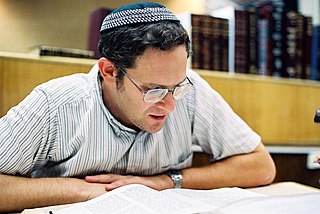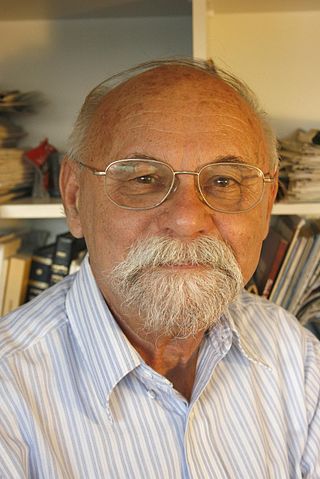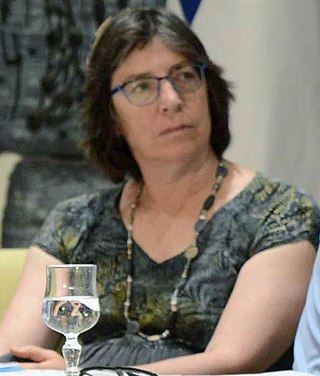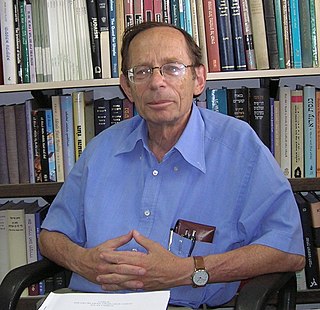This biographical article is written like a résumé .(April 2015) |
Adam S. Ferziger | |
|---|---|
 | |
| Born | November 10, 1964 |
| Occupation | Jewish historian |
| Awards | National Jewish Book Award |
| Academic background | |
| Alma mater | Yeshivat Har Etzion, Yeshiva University, Bar-Ilan University |
| Doctoral advisor | Gershon Bacon |
| Website | https://jewish-history.biu.ac.il/en/node/812 https://biu.academia.edu/AdamFerziger |
Adam S. Ferziger (born November 10, 1964, in the Flatbush section of Brooklyn) is an intellectual and social historian whose research focuses on Jewish religious movements and religious responses to secularization and assimilation in modern and contemporary North America, Europe and Israel. Ferziger holds the Samson Raphael Hirsch Chair for Research of the Torah with Derekh Erez Movement in the Department of Jewish History and Contemporary Jewry at Bar-Ilan University, Ramat Gan, Israel. He is a senior associate at the Oxford Centre for Hebrew and Jewish Studies and is co-convener of the annual Oxford Summer Institute for Modern and Contemporary Judaism. He has served as a visiting professor/fellow in College of Charleston (2017), Wolfson College, University of Oxford, UK (2013), University of Sydney, New South Wales, Australia (2012), and University of Shandong, Jinan, China (2005). In 2011, he received Bar-Ilan's "Outstanding Lecturer" award. Ferziger has published articles in leading academic journals of religion, history, and Jewish studies and is the author or editor of seven books including: Exclusion and Hierarchy: Orthodoxy, Nonobservance and the Emergence of Modern Jewish Identity (Philadelphia: University of Pennsylvania Press, 2005); Orthodox Judaism – New Perspectives, edited with Aviezer Ravitzky and Yoseph Salmon (Jerusalem: Magnes Press, 2006); and most recently Beyond Sectarianism: The Realignment of American Orthodox Judaism (Detroit: Wayne State University Press, 2015), which was the winner of a 2015 National Jewish Book Award.
In his capacity as a senior research fellow at Bar-Ilan's Rappaport Center for Assimilation Research, Ferziger authored major analyses of religious leadership, and of novel frameworks for promoting Jewish identity. He served for over ten years as a historian for Heritage Seminars to Eastern Europe. In the latter role he taught thousands of American youth about the legacy of Eastern European Jewry and the destruction of the Holocaust. He has presented invited talks and participated in international conferences at institutions of higher learning worldwide including: Central European University – Budapest, Columbia University, Harvard University Law School, The Hebrew University - Jerusalem, New York University, Hebrew Union College - Los Angeles, Jewish Theological Seminary, Monasch University - Melbourne, Northwestern University, Open School – Belgrade; University of Oxford, Princeton University, Rice University, Tel Aviv University, UCLA, University of Cape Town, University of Chicago, University of Frankfurt, University of Hamburg, University of Scranton, University of Sydney, and Yeshiva University. He is also invited regularly to lecture publicly throughout Israel, North America, Continental Europe, South Africa, and the United Kingdom.
A native of Riverdale, New York, Ferziger was educated at the SAR Academy and the Ramaz School in New York and in the study halls of Beit Midrash l'Torah and Yeshivat Har Etzion in Israel.[ citation needed ] He received his B.A., M.A. (mentor Professor Jacob Katz), and rabbinical ordination from Yeshiva University, and his Ph.D. Summa Cum Laude (mentor Professor Gershon Bacon) from Bar-Ilan University. He and his wife, Dr. Naomi (née Weiss) Ferziger (mentors Professor Ari Zivotofsky and Professor Ruth Feldman [1] ), moved to Israel in 1989 and raised their six children in the city of Kfar Saba, where he is active in teaching and facilitating connections to Jewish religious life for all sections of the local population.








